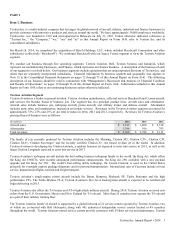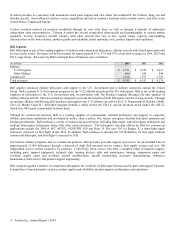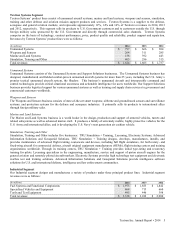E-Z-GO 2014 Annual Report Download - page 19
Download and view the complete annual report
Please find page 19 of the 2014 E-Z-GO annual report below. You can navigate through the pages in the report by either clicking on the pages listed below, or by using the keyword search tool below to find specific information within the annual report.protect the intellectual property developed through these efforts. Likewise, new products and technologies could generate
unanticipated safety or other concerns resulting in expanded product liability risks, potential product recalls and other regulatory
issues that could have an adverse impact on us. Furthermore, because of the lengthy research and development cycle involved in
bringing certain of our products to market, we cannot predict the economic conditions that will exist when any new product is
complete. A reduction in capital spending in the aerospace or defense industries could have a significant effect on the demand for
new products and technologies under development, which could have an adverse effect on our financial condition and results of
operations. In addition, the market for our product offerings may not develop or continue to expand as we currently anticipate.
Furthermore, we cannot be sure that our competitors will not develop competing technologies which gain superior market
acceptance compared to our products. A significant failure in our new product development efforts or the failure of our products
or services to achieve market acceptance relative to our competitors’ products or services could have an adverse effect on our
financial condition and results of operations.
We are subject to the risks of doing business in foreign countries.
Conducting business internationally, including U.S. exports, exposes us to additional risks than if we conducted our business
solely within the U.S. We maintain manufacturing facilities, service centers, supply centers and other facilities worldwide,
including in various emerging market countries. We also have entered into, and expect to continue to enter into, joint venture
arrangements in emerging market countries, some of which may require capital investment, guaranties or other commitments. We
expect that our international business and our investment in emerging market countries will continue to increase. Risks related to
international operations include import, export and other trade restrictions; changing U.S. and foreign procurement policies and
practices; restrictions on technology transfer; difficulties in protecting intellectual property; increasing complexity of employment
and environmental, health and safety regulations; foreign investment laws; exchange controls; repatriation of earnings or cash
settlement challenges, competition from foreign and multinational firms with home country advantages; economic and government
instability, acts of terrorism and related safety concerns. The impact of any one or more of these or other factors could adversely
affect our business, financial condition or operating results.
Additionally, some international government customers require contractors to agree to specific in-country purchases,
manufacturing agreements or financial support arrangements, known as offsets, as a condition for a contract award. The contracts
generally extend over several years and may include penalties if we fail to perform in accordance with the offset requirements
which are typically subjective. We also are exposed to risks associated with using foreign representatives and consultants for
international sales and operations and teaming with international subcontractors and suppliers in connection with international
programs. In many foreign countries, particularly in those with developing economies, it is common to engage in business
practices that are prohibited by laws and regulations applicable to us, such as the Foreign Corrupt Practices Act. Although we
maintain policies and procedures designed to facilitate compliance with these laws, a violation of such laws by any of our
international representatives, consultants, joint ventures, business partners, subcontractors or suppliers, even if prohibited by our
policies, could have an adverse effect on our business and reputation.
We are subject to increasing compliance risks that could adversely affect our operating results.
As a global business, we are subject to laws and regulations in the U.S. and other countries in which we operate. Our increased
focus on international sales and global operations requires importing and exporting goods and technology, some of which have
military applications subjecting them to more stringent import-export controls across international borders on a regular basis. For
example, we sometimes initially must obtain licenses and authorizations from various U.S. Government agencies before we are
permitted to sell certain of our aerospace and defense products outside the U.S. Both U.S. and foreign laws and regulations
applicable to us have been increasing in scope and complexity. For example, both U.S. and foreign governments and government
agencies regulate the aviation industry, and they may impose new regulations with additional aircraft security or other
requirements or restrictions, including, for example, restrictions and/or fees related to carbon emissions levels. Changes in
environmental laws and regulations, including those enacted in response to climate change concerns and other actions known as
“green initiatives,” could lead to the necessity for new or additional investment in product designs or manufacturing processes and
could increase environmental compliance expenditures, including costs to defend regulatory reviews. New or changing laws and
regulations or related interpretation and policies could increase our costs of doing business, affect how we conduct our operations,
adversely impact demand for our products, and/or limit our ability to sell our products and services. Compliance with laws and
regulations of increasing scope and complexity is even more challenging in our current business environment in which reducing
our operating costs is often necessary to remain competitive. In addition, a violation of U.S. and/or foreign laws by one of our
employees or business partners could subject us or our employees to civil or criminal penalties, including material monetary fines,
or other adverse actions, such as denial of import or export privileges and/or debarment as a government contractor which could
damage our reputation and have an adverse effect on our business.
We are subject to legal proceedings and other claims.
We are subject to legal proceedings and other claims arising out of the conduct of our business, including proceedings and claims
relating to commercial and financial transactions; government contracts; alleged lack of compliance with applicable laws and
13
Textron Inc. Annual Report • 2014
























